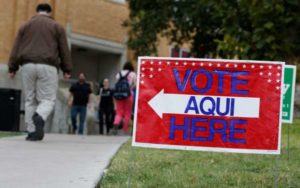
Recent studies by the Pew Research Center show that Latino voters will make up 12.8 percent of all eligible voters, including the four million citizens age 18 or older who reached voting age between 2014 and 2018.
While many Latino registered voters are concerned about immigration policy, like most voters they also are interested in knowing how elected officials are addressing core issues such as education, jobs, and the economy, according to a UConn political science professor studying Latino voters.
Beth Ginsberg, assistant professor-in-residence of political science at UConn’s Stamford campus, is using U.S. Census data since 2000 while conducting her own research on Presidential elections to study Latino voters. “If you took a survey of Latinos and asked what their most concerning issue is, education and the economy would be in the top five. And that’s throughout any Latino subgroup, it’s too easy to just assume that Latinos are only concerned about immigration. I think it simplifies them, which is not the way to look at it. Latinos have a variety of issues and concerns and policy issues that worry them.”
Pew notes that 71 percent of eligible Latino voters live in six states – California, Texas, Florida, New York, Arizona, and Illinois. Yet three of the Congressional districts with the largest growth in Latino eligible voters in 2018 are in North Carolina. Ginsberg says Florida’s election presents an interesting study in voter behavior this year, after many Puerto Rican citizens left the island last year and settled in Florida following the devastation of Hurricane Maria and given the Sunshine State’s dual U.S. Senate and gubernatorial election races.
She adds that the presence or absence of Latino candidates also will affect voting and election turnout. Latinos will look for a co-ethnic on the ballot before considering another Latino – such as a Puerto Rican voter looking for a Cuban candidate – before moving on to vote for other candidates.

Recent Comments